The Baking Powder Controversy - 1907
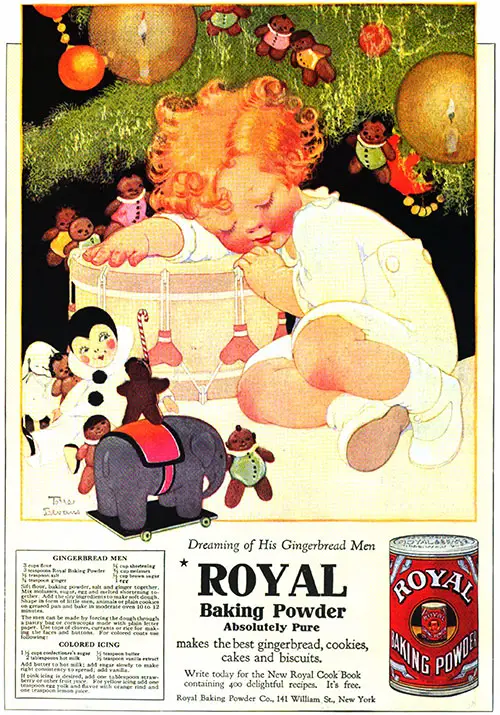
Compounds such as tartaric acid, cream of tartar, primary calcium phosphate, and acid sodium aluminum phosphate (alum) react with baking soda which is an alkaline powder.
These compounds are inert when dry; but, when wet, they react with each other with the production of carbon dioxide.
In 1852, Dr. Vincent Price, was a student of pharmacy in Troy, NY. He was disturbed by the fact that his mother's dyspepsia prevented her eating yeast bread.
Well-equipped with the knowledge, and seeking for a substitute for yeast, he mixed some cream of tartar and soda to be used in place of yeast in making warm bread…. The result was the baking powder.
The baking powder industry was thriving. The company Royal Baking Powder capitalized on the traditional cream of tartar while Calumet and Clabber Girl aimed to be more modern by using alum, which was cheaper and much stronger than other baking powder acids.
However, in 1899, Royal managed to bribe the Missouri legislature to pass a law banning the sale of all alum baking powders in the state.
The Baking Powder Wars continued for several years, and eventually, the alum baking powder companies won out, and Clabber Girl acquired Royal company.
Report of the Secretary, American Baking Powder Association, 16 October 1900.
It devolves upon your Secretary at the annual meeting to render an account of the work of the Association during the preceding year, and in this, the first report of the Association, your Secretary believes that certain facts preliminary to the formation of the organization should be made a matter of historic record.
This feature of the report will be of special interest to those who have become co-workers since the date of organization, and who are not familiar with the struggles which brought about the crystallization of this great industry in the American Baking Powder Association.
The controversy which has waged persistently between the manufacturers of cream of tartar baking powder and the manufacturers of "alum" and "alum phosphate'' baking powder had become more and more acute, and the sentiment created against the use of "alum" in baking powder by the unwarranted public attacks made upon it by the cream of tartar interests, which created in the public mind a sentiment so opposed to the use of "alum" in any form in the preparation of food, was enough to apparently justify legislative restrictions.
The cream of tartar interests, seizing upon this prejudice of their own creation, and utilizing the fruits of an advertising policy which had for years been growing towards this end, began to harass the manufacturers of baking powder using ''alum," with such restrictive legislation.
The state laws enacted usually provide that "alum," when used in baking powder, should be designated upon the can. It is probable that had the manufacturers of baking powder containing alum earnestly advertised the wholesomeness of their product and had as boldly announced in those early days the superiority and greater economy in the use of "alum" public sentiment would have been divided, and, further, had the public become familiar with the statement upon every can of "alum" baking powder that it contained "alum" and that the manufacturer believes its use to be in harmony with the scientific progress, this state legislation, which was designed to embarrass the manufacturer of "alum" baking powder, would either not have been enacted at all, or would have had little effect; but, owing to the fact that the prejudice against the use of "alum" had been created, and that no physiological investigations had been made as to its wholesomeness, it is doubtful whether all the manufacturers of alum baking powder were really sure, that is, scientific ally sure, of the wholesomeness of their product, although they had before them the stupendous physiological fact that it was being used in constantly increasing quantities with no deleterious effect on the people.
The manufacturers of "alum" baking powder, while annoyed and harassed, found, in spite of these restrictions and the public prejudice, that because of the economic advantages their powder possessed (as both economy and effectiveness were on their side of the controversy), they were making rapid progress in the extension of their business, and serious inroads into the trade of the manufacturers of cream of tartar baking powder.
Therefore, with self-satisfied complacency, basing their hope upon their economic advantage and avoiding issue as to the wholesomeness of their product, they gave ground for the assumption on the part of the people at large that the uncontradicted statements of the cream of tartar manufacturers must be true, and in this manner their case before the people went by default.
At about this period, the manufacturers of cream of tartar baking powders, formed, in connection with the manufacturers of cream of tartar, a combination, or trust, capitalized for $20,000,000, known as the Royal Baking Powder Company.
This organization contained within its Board of Directors the active minds which have originated and were carrying out the policy of prejudicing the people against the use of "alum"; men shrewd enough to recognize that the economic advantage possessed by the manufacturers of "alum" baking powder would ultimately lead to the extinction of the cream of tartar interests, unless the prejudice was maintained and enhanced.
The concentration of the cream of tartar interests accentuated to a marked degree the attacks upon baking powders containing "alum," and after several abortive attempts so crystallized public sentiment into legislation that at last, surreptitiously and ingeniously a law was passed through the Legislature of Missouri, a law, apparently for the purpose of prohibiting the use of poison in the preparation of food, but which contained the word "alum," and thereby included, not only the manufacturers of "alum" and "alum phosphate" baking powder in the State of Missouri, but those elsewhere whose business extended within the boundaries of that commonwealth.
Practically the first intimation of the existence of this law was the threatened arrest of manufacturers under its provisions. The manufacturers of Missouri organized an Association and sought co-operation and funds not only from the manufacturers of baking powder, but from the manufacturers of material used in baking powder, and originated the test case, known as the "State of Missouri vs. Whitney Layton."
The discovery of the sweeping effect of this law, and the successful efforts at organization of the western manufacturers, aroused the manufacturers of baking powder in the south and east, and after several preliminary meetings, a call was issued for a meeting of organization, to be held in New York City in a room in the Mutual Life Insurance Building, set apart for the purpose through the courtesy of the General Chemical Company.
The meeting of organization was called to order by Mr. J. W. Delaney, acting as chairman pro tern. Mr. J. J. Higgins was elected permanent Chairman of the meeting, and A. C. Morrison was asked to act as Secretary pro tern. Thirteen manufacturers of baking powder were present, and Mr. George W. Kenyon, of the General Chemical Co. ; E. J. Heller, of the Hygienic Chemical Co. ; F. P. Gordon, of the Provident Chemical Works, and Mr. Arthur Wyman, of the Pennsylvania Salt Mfg. Co., were also in attendance.
The meeting was called on October 2G, 1899, at 11 A. M. This meeting was adjourned from time to time and closed after the election of the Executive Committee in the afternoon of October 28th.
The Association adopted a Constitution and by-laws, and gave itself the name "American Baking Powder Association," agreed to take up all the resources of the Missouri, or western organization and carry out the purposes of that Association, to complete the test case through the Supreme Court, and protect the different interests of its members in all sections of the country, and thus it became truly National.
At the first meeting of the Executive Committee, held at 3 P. M., October 29th, Mr. J. J. Higgins was elected President, and Mr. Chas. E. Jaques, Vice-President; Mr. E. G. Leigh, Jr., F. J. Ach and Mr. Hooper Coyne, members of the Executive Committee. Subsequently, Mr. Patterson Bain, of St. Louis, was elected a member of the Executive Committee. Mr. A. C. Morrison was appointed Secretary-Treasurer.
Before this meeting of organization adjourned, a telegram was received from Georgia announcing the introduction of the Missouri law in that State. Therefore, before the Association was fairly born it was called upon to fight its first battle.
Every energy of the Association was taxed to prevent the passage of the bill in Georgia, which was introduced and re-introduced most persistently and kept alive by legislative trickery, thereby disclosing a vitality born only of the masterful purposes of the cream of tartar interests. This attempt at legislation was followed to its final defeat.
Before the Georgia Bill was disposed of, a communication was received from Chicago that Senator W. E. Mason, of Illinois, would continue his food investigations in New York, and that it was probable he would secure further paid evidence against the use of "alum"' in the preparation of food.
Arrangements were immediately made with Senator Mason in New York by which the Association could be constantly represented at the hearings. During every day of the session in New York City, the Association was thus represented.
Certain chemists were to appear and testify to the harmfulness of "alum,"' but were delayed one day. On the morning following, and before they had given any testimony whatever, an advertisement of the Royal Making Powder Company quoted the testimony which it was arranged teas to have, been given the day before. This caused considerable embarrassment to the chemists, and the presence of representatives of the Association completed the defeat of the opposition.
Evidence was secured which indicated clearly that the hand of the cream of tartar interests was deep in this matter. This evidence, however, was merely supplemental, as the hearings in Chicago had disclosed the purpose of the cream of tartar interests to secure a report of a United States Senator condemning our product.
Arrangements were made with Mr. Mason for an appearance before his committee at Washington, at which the merits of "alum" could be discussed and made of record in his report. Mr. Leigh while still busy with Georgia, received an intimation that a bill would be introduced in the State of Virginia similar to the Georgia bill.
On the very morning of the opening of the Legislature, the bill appeared, and the perfect avalanche of evidence which Mr. Leigh had accumulated dropped upon it with a suddenness that flattened it into practical extinction.
It was, however, later resuscitated by its advocates, and once more flattened. A pure food bill then appeared in the Senate, which included a clause which might be construed against "alum" baking powder.
By this time, Mr. Leigh had become so aroused that he appeared before the Senate Committee and demanded to know from the author of this bill, whether it was intended to include in its provisions, "alum" baking powder, which had been tried and acquitted before the jury of public opinion in that: state in two instances in the same Legislature. The author of the bill declared that it was not intended to cover baking powder. Whereupon Mr. Leigh demanded that a specific clause be placed in the pure food bill exempting "alum" baking powder from its provisions.
Virginia blood ran hot both in the Senate and Assembly, but Mr. Leigh never ceased bis efforts until his clause was made a law of the commonwealth, thereby establishing a precedent and the only specific instance where "alum" baking powder is protected by the laws of this great land.
The commendable energy and great eloquence of Mr. Leigh before the Senate of his state are matters of history, and undoubtedly mark a great epoch in the progress of a movement to rehabilitate "alum" with the mantle of its supremacy.
During this period, the physiological experiments for the Missouri test case were under the careful direction of Dr. Austen, and were progressing as rapidly as possible in preparation for the battle royal which was to occur in that state.
During the interval between December 22nd and 2Gth, your Secretary visited Chicago and St. Louis; received from the St. Louis Association the balance of cash in its possession, and a statement of all the obligations which that Association had incurred.
In company with Mr. Ach he investigated the conduct of the Missouri case, and learned with much gratification of the splendid basis for this case which the St. Louis Association and the attorneys employed by them had prepared.
A meeting of the St. Louis members was held, and those present contributed, in addition to the different amounts subscribed by them, various sums equaling their assessments for one year, and congratulations upon the affiliation of the western and eastern interests were exchanged.
A visit was made to Chicago, at which time several additional members were secured, and the history of the Association was brought up to date with these members in Chicago.
A label bill at this time appeared in Kentucky, aimed directly at "alum," and through the efforts of Mr. Rew, of Chicago, it was amended to include all baking powders before passage. When evidences of the introduction of a bill became apparent in Iowa, Mr. Jaques and the Missouri and Iowa members prevented it getting beyond the committee to which it was first referred.
This bill contained provisions which might affect "alum" baking powder, but was apparently not originated by the cream of tartar interests. The date of the hearing of the Missouri case, having arrived on December 22nd, Messrs. Seddon & Blair, who entered into a stipulation with the attorney of the Royal Baking Powder Co., who was conducting the case for the State of Missouri, wanted to have the matter postponed until January 22nd, as had been understood and practically agreed upon, and were confronted with the most extraordinary breach of ethics on the part of the opposition's attorney, who stated that he was obliged to violate his stipulation and insist upon an immediate trial, under instructions from his client.
It was only a fortunate coincidence for the Association that Mr. Whitney Lay ton was sick and could not appear and the case was finally postponed until January 11th. This early hearing, it was immediately foreseen, would require depositions to be taken in New York some days prior to January 11th, thereby shortening the time for physiological experiments, thus jeopardizing their logical conclusion.
Strenuous efforts were made to bring them to finalities on time, and arrangements were made for the depositions to be taken in the office of the Association, beginning January 2nd, 1900.
The taking of depositions occupied several days, and as the verbatim reports of the trial which the members have received contain the complete matter, no record of the results will be given here, but it is interesting to know that during the entire investigation Mr. Porter, Vice-President of the Royal Baking Powder Co., and Mr. McMurtrie.
its chemist, were present in the office of this Association, openly and freely giving advice and counsel to Mr. Cunningham, who pretended to be the attorney for the State of Missouri, but as was well-known, was the attorney of the Royal Baking Powder Co. The barefaced effrontery of this has, I believe, never been equaled.
They were, however, treated with courtesy, and they heard so much to disprove the claims made in their libelous advertising that they cannot now make any pretense of sincerity, but must be knowingly publishing false hoods for the suppression of an honorable industry.
An amusing incident occurred, which is worthy of note. One of the workmen employed by the Pennsylvania Salt Mfg. Co., in their grinding room, who appeared as a witness, testified that for years he had been breathing "alum" dust in unknown, but very large quantities, and that he had never missed a day during the many years of his employment in that institution.
At the close of the examination Major Cunningham, the attorney of the Royal Baking Powder Co., said that he felt that his health demanded that he should move to the vicinity of the Pennsylvania Salt Works; it was evidently the greatest health resort in the country ; whereupon one of the workmen produced a pound of exsiccated "alum" and said, that to convince Mr. Cunningham of his sincerity in his testimony as to the healthfulness of "alum," he would then and there eat the pound of "alum," and, if necessary, would send to Philadelphia for more.
The humor of this situation can be well understood when it is said that Porter, McMurtrie and Cunningham put their heads together so that a barrel hoop would have covered all three, and kept them in close consultation one hour and forty-five minutes after the testimony had been given.
Beginning early in January, a peculiar situation developed in the State of Minnesota. The Label Law having gone into effect, the Royal Baking Powder Co. refused to label their goods. In this stand they received aid and comfort from the food commissioner and hostility and discomfort from the manufacturers of "alum" baking powder in that vicinity.
The manufacturers of "alum" baking powder having conformed to the law, proposed to insist that the trust powder should also be brought under its ruling. Manufacturers of cream of tartar baking powder contended, however, that as they were the only pure and virtuous manufacturers in the country, to brand them in the same manner as "alum" and "alum phosphate" powders were branded was an insult and implied impurity.
Minnesota members decided to force an issue and insist upon conformity to the law. Dealers in cream of tartar baking powders were arrested and the Royal Baking Powder Co. decided to carry the matter into the courts.
After considerable litigation, the Supreme Court of Minnesota decided that they must label, but during the interval of three months, they were practically out of the market in the State, and the people learned that "alum" and "alum phosphate" baking powders were equally effective, much more economical and wholesome, and, they continued to use them. It is now confidently stated that fully eighty (80) per cent, of the business formerly done by the Royal Baking Powder Co. in the State of Minnesota has been taken away from them by the "alum" baking powder interests.
The burden of expense of these litigations having become onerous, the Minnesota manufacturers organized a Minnesota Association. They then made a proposition that they would come into the American Baking Powder Association as permanent members, provided they were allowed to use the name of the Association in their litigations, and that they should conduct these litigations in their own way, withdrawing from the American Baking Powder Association, for the expenses of the litigations, the amount paid in by them and no more.
They agreed to bear all expenses in excess of the amount paid by them into the Association. From that date until almost the present time, the Minnesota Association, headed by Mr. J. W. Cooper, of St. Paul, has manfully lived up to this agreement, though the expense of the litigation which will fall upon them is nearly $3,000 in excess of the amount turned over to them by the American Baking Powder Association.
The Supreme Court having decided against the Royal Baking Powder Co., they now label in that State. As a retaliatory measure they recently began arrests of retail dealers selling baking powder alleged to contain a harmful and deleterious substance to wit: "Alum."
When it becomes necessary to meet this issue we have retained for this purpose Messrs. Palmer & Beek, of St. Paul, who had charge of the previous litigations, and the Minnesota Association is relieved of any further responsibility, as they are members of the National Association. The national character of this struggle had become apparent to everyone who was cognizant of it.
As the more recent details of the Minnesota situation are in the hands of Mr. Jaques and Mr. Cooper, who have this matter in charge as a special committee, I will omit further reference to this State in this report.
A careful collection of the outrageous attacks of the Royal Baking Powder Co. was made and the question of bringing a libel suit to prevent the further publication of this matter was most carefully considered.
The blind advertisements were apparently constructed for the cream of tartar interests by lawyers and could not singly be regarded as libelous. The collection, however, was undoubtedly libelous, and the conclusion was reached that a successful suit could be brought.
After giving the matter considerable discussion, in which the advantages both pro and con were, carefully weighed and investigated, it was concluded inexpedient at this time to bring such a suit.
About January 10th the Missouri Bill appeared in the Mississippi Legislature. In anticipation of the introduction of this bill, a great deal of work had been done to acquaint legislators in that State with the nefarious character of the expected legislation.
It was learned that this bill was introduced by the Senator from the district in which a prominent official of the Royal Baking Powder Company had a winter home. The signatures of a very large number of his constituents were secured, protesting against this class of legislation, in much the same manner as had been done previously in Virginia.
The Governor of Mississippi became interested in the matter and the Senator withdrew the bill in open Senate. After a short time, when matters had quieted down, the same bill was introduced in the Assembly, was caught in time, referred to a committee, and died there.
Mr. Coyne had by this time taken Maryland thoroughly in hand.
Innumerable letters were written to Senators, Assemblymen and State officials; local chemists were asked for opinions, and the introduction of the Missouri Bill was there prevented.
In South Carolina educational efforts were undertaken prior to the assembling of the Legislature, and during the session one of the Representatives of the Association saw a letter written by an agent of the cream of tartar interests saying that sentiment was against the Missouri Bill and that it was inexpedient to introduce it.
In New Jersey we were informed through Dr. Austen of the introduction of the Missouri Bill, which was caught in committee and blocked. It was again introduced and again beaten. Subsequently, by the merest chance, a Bill, introduced under the title of "A Bill to Amend a Bill for the Suppression of Crime," was discovered to contain among other provisions, the Missouri law.
The Association immediately informed Mr. R. B. Davis, of New York, of this sly bit of legislation, and as he was acquainted with the Senator who introduced it, he succeeded in securing its withdrawal. Mr. Davis being a resident of the State of New Jersey, gave great assistance to the Association.
Two bills were introduced in the State of New York, the first in the Senate. The Association appeared before the Senate Committee, but in spite of the fact that the matter was given its true character before that committee, it was reported favorably to the Senate.
The assistance of influential Senators was secured, and the bill never got off the calendar. Finding that legislation was to be prevented in the Senate, the same bill was introduced in the Assembly and was not stopped until a hearing before the Committee on Rules prevented its being reported on.
New York State was one of the most difficult and persistent struggles that we had in any of the States, and our final success there was a great source of congratulation.
In Rhode Island, arrangements were made by which every bill was carefully scrutinized, but no attempt appeared in that State to introduce hostile legislation.
In Massachusetts every bill was read and carefully followed, but nothing appeared there.
In North Carolina a great deal of work was done in preparation for the introduction of the bill, but it did not appear.
From January 12th forward the Missouri case was tried, with the results already known to you. The record disclosed clearly the hand of the Royal Baking Powder Co. in this matter and the confessions under oath of the chemists testifying against ''alum" that they were in the employ of the Royal Baking Powder Co. became later of extra ordinary value in Washington.
The work of all those connected with the Missouri case showed a thoroughness and intelligence which were extremely commendable. The work of Dr. Austen in planning the physiological experiments and the informal ion which he gave the attorneys regarding the diplomatic chemistry were of inestimable value. Mr. Rew's information, both of chemistry and the business side of the question, was very necessary and very useful. Mr. Stoner's work in outlining and arranging for the evidence required and his production of witnesses at the proper time was a great piece of work.
The indefatigable and tireless activities and efforts of Mr. Bain during the whole controversy are well-known to the St. Louis members, if not to the Association at large.
Throughout the entire Missouri case, and, in fact, permeating all the affairs of the Association where legal advice has been required, the firm of Winston & Meagher, of Chicago, and especially Mr. Strawn, of that firm, has been of immeasurable service.
It is through the generous and extremely helpful policy of the J. C. Grant Chemical Co. that the services of these distinguished attorneys have been made available to us, and the members of the Association can scarcely overestimate the value of the persistent and quiet co-operation of this Chicago member.
As the Missouri case has been appealed and is a matter of history, we will leave it here with the simple remark that after a careful perusal of the briefs, the conclusion must be inevitable that we have a strong chance of winning. In any event, the wholesomeness of food prepared with "alum" baking powder has been fully demonstrated and we can only sincerely hope that the unconstitutionality of the law may be proved.
Illinois has a Pure Food Law which, in design, could scarcely be interpreted as bearing upon baking powder containing "alum,"' but the new Food Commissioner, Jones, among his first acts, issued a ruling to the effect that all baking powders must be labeled in a certain way.
There was no basis for this ruling in the law and he was so informed. Legal opinions were given by competent attorneys through the courtesy of the J. C. Grant Chemical Co. and others, but they had no effect. Mr. Jaques, as the member of the Executive Committee in Chicago, called several meetings of the Chicago manufacturers, who interested themselves in the matter, and the Merchants' Association of Chicago was called into active opposition to the Commissioner's ruling.
A sharp and intelligent controversy arose, in which the 'Merchants' Association, on behalf of the Chicago manufacturers, bore the brunt and expense of the fight. Mr. Bartlett, of the Pennsylvania Salt Mfg. Co., was especially active in the matter, and of great assistance both to the Merchants' Association and the American Baking Powder Association at this time.
The result was the practical, though not the actual withdrawal of the ruling by the Commissioner and the necessity of labeling in this State is not no insisted upon.
In the State of Ohio a bill for the regulation of baking powder was introduced under the provisions of which no baking powder of any kind whatever could be sold. It was visibly a strike bill, and was not introduced at the suggestion of the Royal Baking Powder Co.
Mr. Ach and Mr. Parlin took up the matter, and in a short time had the bill in committee, where it lingered for a while, and then passed away. As the parentage of this bill was known, though obscure, neither Mr. Ach nor Mr. Parlin felt that any epitaph was necessary, and, although they had left no stone unturned, they felt that no monument was needed to mark its final resting place.
In England the law under which the Norfolk Baking Powder case was tried and under which it was declared that baking powder was not a food, was in the early part of the year amended so as to include articles used in the preparation of food.
The first effect of this modification became apparent in Canada.
It would be too much to assert that it was simply because of the English decisions that the Canadian officials became interested in this law, but it is extremely probable that their attention was called to the matter and they were urged to act by interests which would be much benefited by the exclusion of "alum" baking powders from the markets of the Dominion.
In any event, two chemists in the Department of Internal Revenue made a series of analyses of baking powders and issued a bulletin which was merely a rehash of the Royal Baking Powder literature. Acting upon the information contained in this bulletin, and upon the advice of his subordinates, and by his own confession without any knowledge of the literature of the subject, the Commissioner of Internal Revenue issued a bulletin prohibiting the manufacture or sale of baking powder containing "alum," after the first day of October.
Letters and literature were immediately sent from our Association to Canadian officials, and a postponement was secured until December 1st. Our Association at once suggested the formation of a Canadian Association, and the idea almost immediately bore fruit.
The General Chemical Co., as soon as informed of the Canadian situation, became interested and did most powerful work in the Dominion. The Provident Chemical Works, through its representative, Mr. Young, made a splendid presentation of the case to the Internal Revenue Commissioner.
This, coupled with the protests of the home manufacturers, and the formation of the Canadian Association, resulted in the withdrawal of the ruling and the statement that it would not become operative until one year from December 1st.
The Canadian manufacturers of Baking Powder must appreciate the efforts of the American Baking Powder Association taken in the spirit of generous fraternity before they were organized for the struggle before them, as this Association was largely responsible for the modification of the law.
The best recognition on the part of the Canadian Association of the assistance rendered them is the fact that they are now thoroughly organized and thoroughly capable of taking care of themselves, and express their appreciation of the spirit of reciprocity and have done more in sending a delegate, Mr. Wm. Dobie, of Toronto, to this meeting, who represents them and who will offer, on behalf of his association, to extend the strong hand of friendship and mutual co-operation.
The pure food investigations of Senator Wm. E. Mason, of Illinois, were approaching their conclusion when Dr. Austen appeared before the committee by arrangement in Washington, and gave evidence regarding the physiological experiments conducted with the co-operation of Dr. Austin Flint and Dr. E. E. Smith, adding thereto all the scientific data then obtainable regarding the wholesomeness of food prepared with "alum" baking powder.
It was not known at that time that the record of that committee had been filled, page by page, with evidence against the use of "alum" in baking powder, through the efforts of the Eoyal Baking Powder Co., but as all this evidence was practically overthrown by Dr. Austen's testimony, the Royal Baking Powder Co. was obliged to send to Senator Mason thirty-four other witnesses, scientists and physicians, to testify against the use of '"alum" and to endeavor to controvert the truths which this Association had made a part of the records of the investigation.
By this time the existence of a deliberate and well-arranged plan in the National Legislature to destroy the industry of the members of this Association became apparent, and evidences were brought to light showing that for years the cream of tartar interests had been working for National Legislation to their interests, and with a view to the passage of some law which could be so interpreted as to destroy their rivals.
A part of this general plot is outlined in "Bulletin 303," which, through the courtesy of the United States Senate, became a public document, and which is the foundation on which must rest much of our success in future legislative efforts.
Four food bills were pending in Congress, any one of which could, and, we believe, would have been, if passed, interpreted to the practical prohibition of the manufacture of baking powder containing "alum."
The Brosius Bill, and what is now known as the Proctor Bill, were backed by the National Pure Food and Drug Congress, though the Mason Bill had for a time this endorsement. Senator Mason reported as the result of his investigation that his committee believed that "alum" baking powder should be prohibited by law.
This gave our Association an opening by which it could demand the modification of the bills and a justification in its efforts to secure honest legislation on the pure food subject. The annual meeting of the Pure Food and Drug Congress was attended by the Executive Committee and other members, and representatives of manufacturers of material, and at this meeting the first open protest was made against the manipulation of national legislation by the cream of tartar interests.
The floor of the convention having been secured for a representative of your Association, he, in spite of all opposition and all attempts at parliamentary strangulation, without hesitation and in the most unqualified manner, and from the standpoint of the manufacturers of baking powder containing "alum," denounced those features of legislation which seemed to show the hand of the cream of tartar interests. From this point forward the battle between the cream of tartar and "alum" interests has been an open warfare.
Hearings were secured before various committees, at which representatives of both sides of the controversy were present. The publication of the United States Government of "Bulletin 303" was secured.
The acceptance of certain amendments which would protect our industry was favorably considered. The Foster Bill, which was the Missouri law, introduced by Senator Foster by request, was so vigorously attacked that even the Committee on Manufactures, with Senator Mason at its head, did not dare to recommend it favorably to the Senate.
The efforts to pass through the House the Brosius Bill, unamended, during the closing hours of the session, when debate would have been impossible, was prevented in spite of the fact that it had the support of some of the most prominent members of the House.
Over three thousand telegrams and letters were sent to the House of Representatives inside of forty-eight hours by the members of this Association and its friends.
It is impossible without writing a volume on the subject to go into detail regarding the intricacies, diplomacies and subtleties of the Washington situation. Only those who have been very closely in touch with it can grasp it in its entirety and appreciate fully the dangers which confront us there.
Suffice it to say that we are on record as sincerely advocating pure food legislation in our amendments, which are endorsed by some of the strongest minds in both houses, and that the Pure Food and Drug Congress no longer opposes us.
The difficulty of interesting and securing the co-operation of Senators and Representatives in Washington without the intervention of a paid lobby is enormous, and that we have succeeded so well without the utilization of the means sometimes employed in Washington is a lasting credit to the Association, the intelligence with which our work has been conducted and demonstrates the justice of our cause.
The record of the efforts of the Association, which are merely out lined in what has gone before, fails to disclose to the members of the Association not completely in touch with the subject, the infinitude of detail, the restless activities, the earnest and thoughtful diplomacies which have made the first year's work of this Association so phenomenally successful.
From the moment we were organized until the present time we have not failed. At first the opposition did not deem us worthy of consideration, and after having gone forward without hesitation, they had become bold and arrogant and many of their efforts in the early part of this year were characterized by a crudeness and clumsiness which made their defeat almost certain.
Gradually, however, the cream of tartar interests have been brought to a realization that they are opposed by an intelligent body of men determined as they, that a concentration of mentality has been brought to bear upon them, and as they have gradually awakened they have become more skillful, more subtle, more adroit.
Before us looms a future, already black with ominous clouds of battle. The cream of tartar interests are openly announcing that they propose to wear this Association out, and the persistency and continuation of their efforts to paralyze action and weaken our defensive tactics.
Thirty-nine State Legislatures meet during the coming year; Congress still has under consideration, undefeated and unamended, all the bills enumerated in the account above. In many of our States laws similar to the Minnesota law can become the basis of legal prosecutions.
On all sides of us are opportunities for the opposition to menace, harass and attempt to destroy. Their armament consists of a definite, positive, unvarying policy, a concentration of capital, energy and experience.
As a motive power is the fact that unless they succeed in their policy of destruction the economic advantages which our product (now proved wholesome) possesses will drive them from the markets of the world. As their very existence depends upon the destruction of our business, there is little probability that they will desist or recede one jot or tittle from the position they have taken.
Our strength consists in the fundamental fact that truth and right are with us, upon the economic condition which makes our powder more effective and much cheaper than theirs, and that manufacturers using "alum'' in baking powder are gradually becoming (too slowly, but still becoming) aroused to the gravity of the situation.
The apathy which has characterized this body of men for years is giving place to a knowledge of the life and death struggle in which they are engaged and the meetings and hand-clasping which have characterized the last year are finding their expression in a fraternity of interests, a better understanding and a growing confidence in each other which augur well for the coming year.
The success of each member of this Organization is wholly dependent upon its maintenance. In its upbuilding you are creating that concentration of energy and effort and that financial co-operation which are the chief advantages of our opponents.
Let us, then, while congratulating each other upon the success of the past, look forward to the troublous future realizing the gravity of the issues which confront us, and with a determination born of a sense of the righteousness of our honorable calling, our desire to freely transact the business on which our livelihood depends, and our desire to stand before the community in the light of honorable businessmen, resolve to lay aside all personality, and, hand to hand, shoulder to shoulder, to enter the fray like knights of old, determined to win, what is just and right at any sacrifice.
Report of the Secretary, American Baking Powder Association, Annual Meeting, Chicago, Illinois, Tuesday Morning, 16 October 1900.
Cartoons Apropos of Missouri Legislation and Bribery Investigations
This is a series of cartoons depicting the Baking Powder Controversy at the start of 1900.
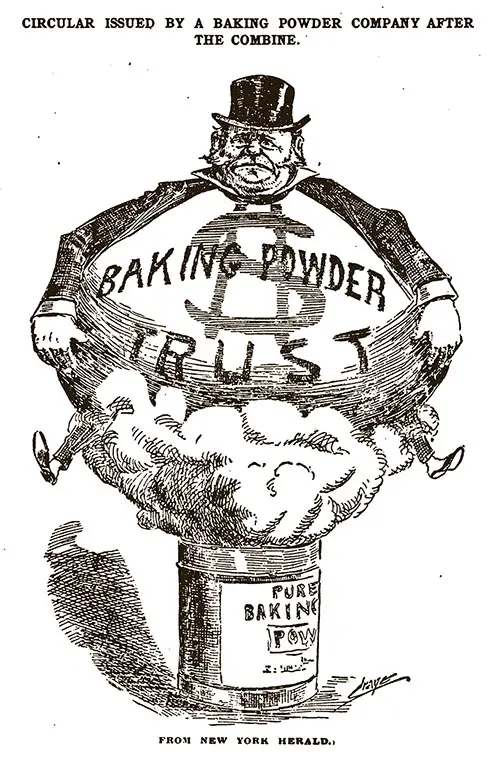 Circular Issued by a Baking Powder Company after the Combine. From the New York Herald. The Baking Pwder Controversy, 1907. GGA Image ID # 163fba2abf
Circular Issued by a Baking Powder Company after the Combine. From the New York Herald. The Baking Pwder Controversy, 1907. GGA Image ID # 163fba2abf
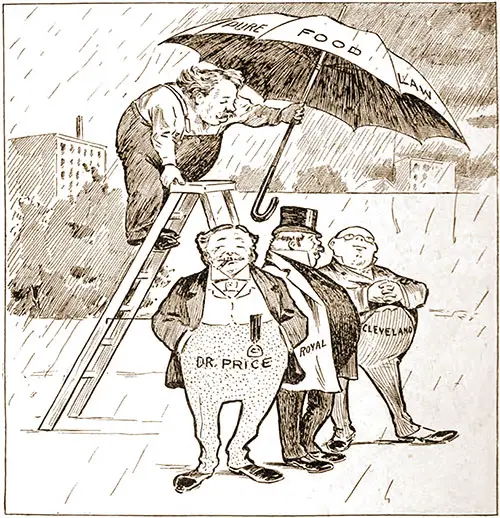
From "The Retailers' Journal" Chicago, July 1, 1899. After Mason Committee Meeting's in Chicago. The Baking Pwder Controversy, 1907. GGA Image ID # 164029dff7
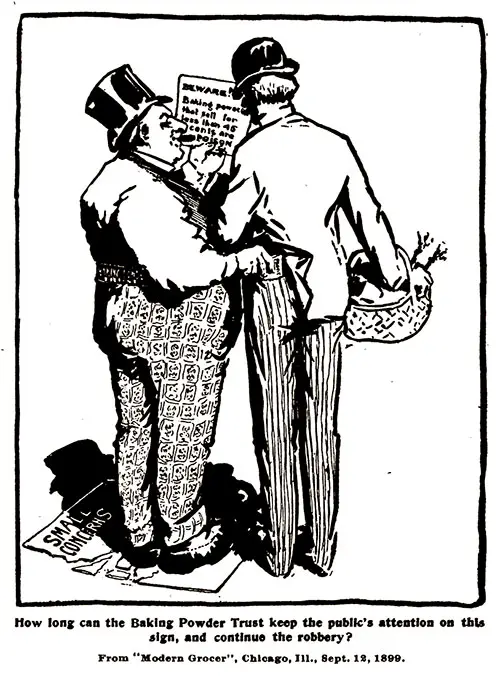 How long can the Baking Powder Trust keep the public's attention on this sign, and continue the robbery? From "Modern Grocer", Chicago, Illinois, Sept. 12, 1899. The Baking Pwder Controversy, 1907. GGA Image ID # 164036fe40
How long can the Baking Powder Trust keep the public's attention on this sign, and continue the robbery? From "Modern Grocer", Chicago, Illinois, Sept. 12, 1899. The Baking Pwder Controversy, 1907. GGA Image ID # 164036fe40
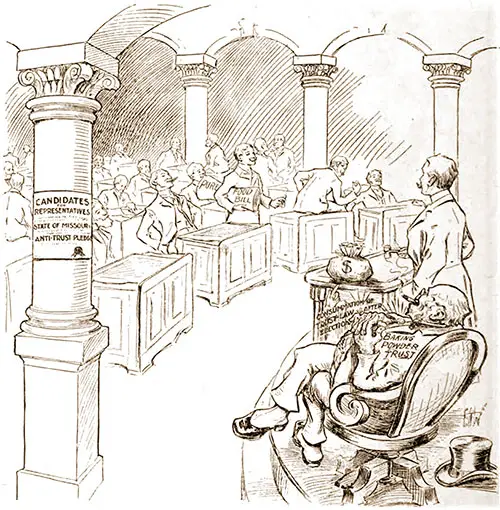
From "The Retailers' Journal", Chicago, October 1st , 1899. The Baking Pwder Controversy, 1907. GGA Image ID # 164086192c
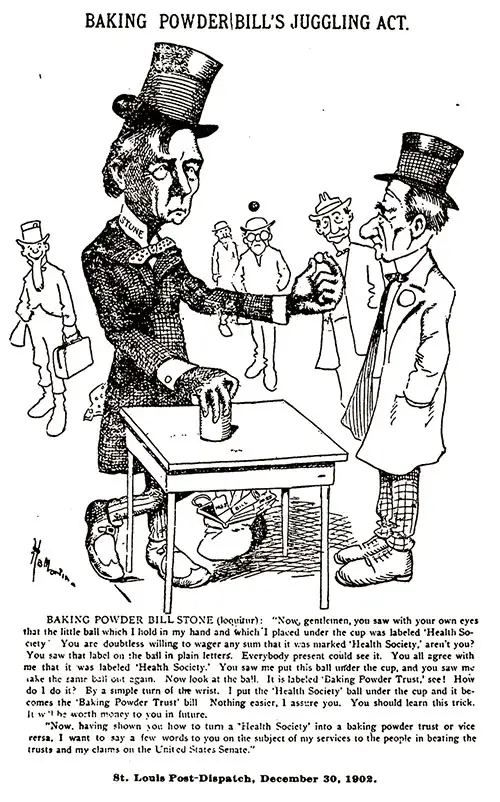
Baking Powder Bill's Juggling Act. St. Louis Post-Dispatch, December 30, 1902. The Baking Pwder Controversy, 1907. GGA Image ID # 1640a0298e
BAKING POWDER BILL STONE (loquitur): "Now, gentlemen, you saw with your own eyes that the little ball which I hold in my hand and which I placed under the cup was labeled "Health Society "
You are doubtless, willing to wager any sum that it was marked "Health Society," aren't you? You saw that label on the ball in plain letters". Everybody present could see it. You all agree with me that it was labeled "Health Society."
You saw me put this ball under the cup, and you saw me take the same ball out again. Now, look at the ball. It is labeled "Baking Powder Trust," see!
How do I do it? - By a simple turn of the wrist, I put the "Health Society" ball under the cup, and it becomes the "Baking Powder Trust" bill. Nothing easier, I assure you. You should learn this trick. It will be worth money to you in future.
"Now, having shown you how to turn a ''Health Society" into a baking powder trust or vice versa, I want to say a few words to you on the subject of my services to the people in beating the trusts and my claims on the United States Senate."
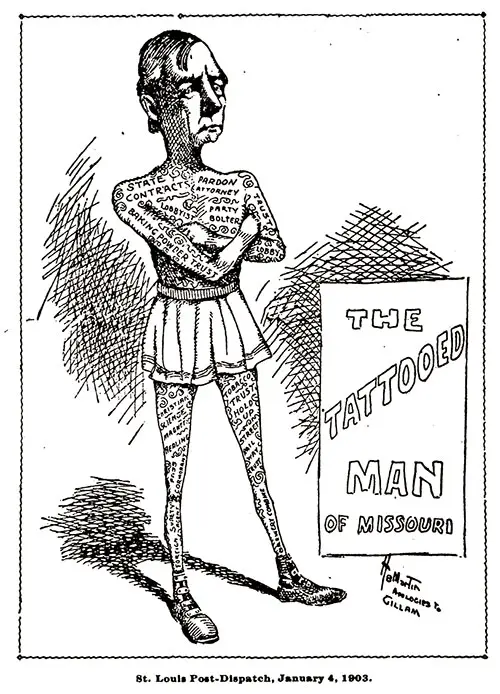
The Tattooed Man of Missouri. St. Louis Post-Dispatch, January 4, 1903. The Baking Pwder Controversy, 1907. GGA Image ID # 1640f93a55
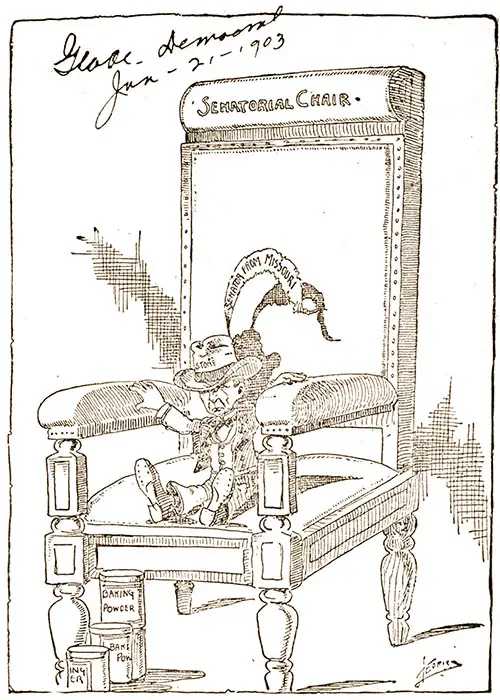 Illustrating Certain Shrinking Qualities. The Globe-Democrat, 21 January 1903. The Baking Pwder Controversy, 1907. GGA Image ID # 16413f7cff
Illustrating Certain Shrinking Qualities. The Globe-Democrat, 21 January 1903. The Baking Pwder Controversy, 1907. GGA Image ID # 16413f7cff
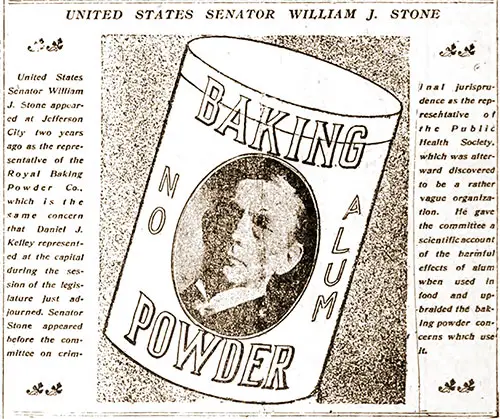
United States Senator William J. Stone "No Alum Baking Powder." St. Louis Post-Dispatch, April 8, 1903. The Baking Pwder Controversy, 1907. GGA Image ID # 164160584f
United States, Senator William J. Stone, appeared at Jefferson City two years ago as the representative of the Royal Baking Powder Co. which is the same concern that Daniel J. Kelley represented at the capitol during the session of the legislature just adjourned.
Senator Stone appeared before the committee on criminal jurisprudence as the representative of the Public Health Society, which afterward discovered to be a vague organization. He gave the committee a scientific account of the harmful effects of alum when used in food and upbraided the baking powder concerns which use it.
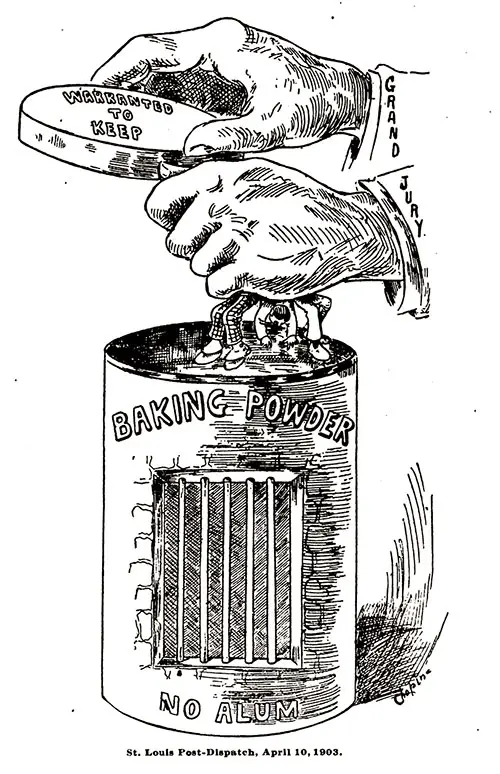
Warranted to Keep -- No Alum Baking Powder. St. Louis Post-Dispatch, April 10, 1903. The Baking Pwder Controversy, 1907. GGA Image ID # 1641682a9e
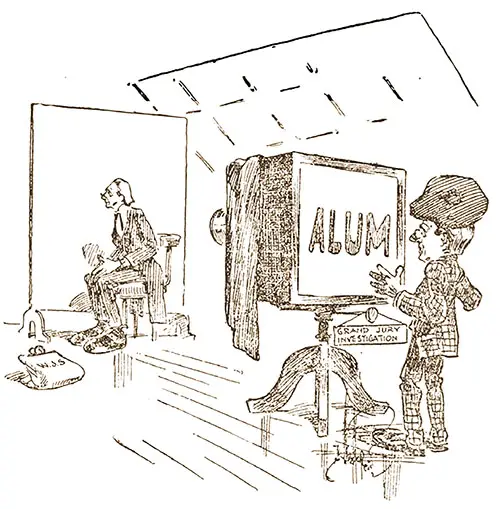
W. J. S. and the Alum Grand Jury Investigation. Kansas City, Mo., Journal, April 10, 1903. The Baking Pwder Controversy, 1907. GGA Image ID # 1641ace0e5
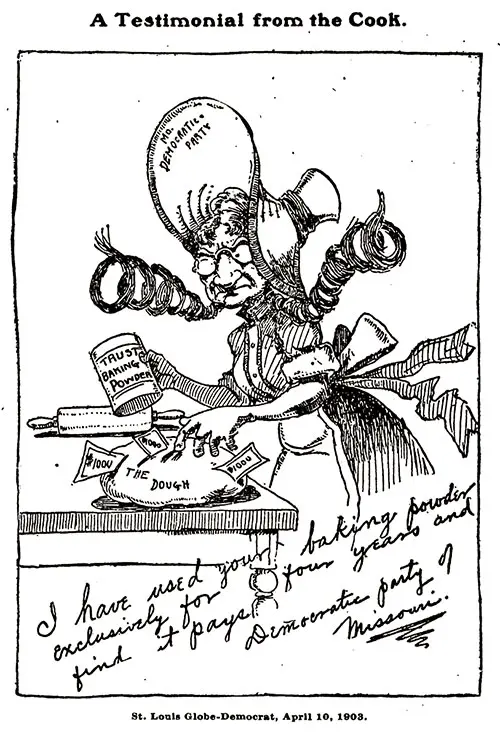
A Testimonial from the Cook. St. Louis Globe-Democrat, April 10, 1903. The Baking Pwder Controversy, 1907. GGA Image ID # 1641ed9a5a
"I Have used your baking powder exclusively for four years and find it pays." Democratic party of Missouri.
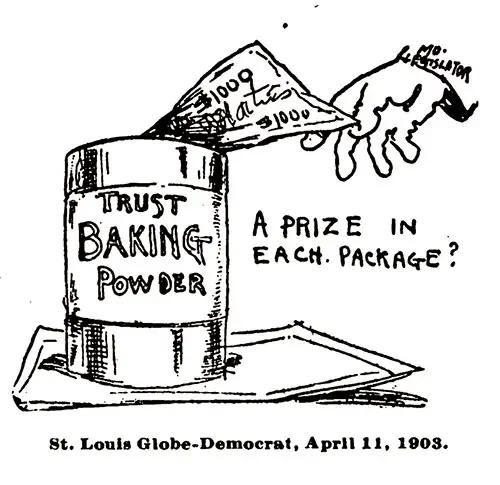
Trust Baking Powder. A Prize in Each Package? St. Louis Globe-Democrat, April 11, 1903. The Baking Pwder Controversy, 1907. GGA Image ID # 16428e56b4
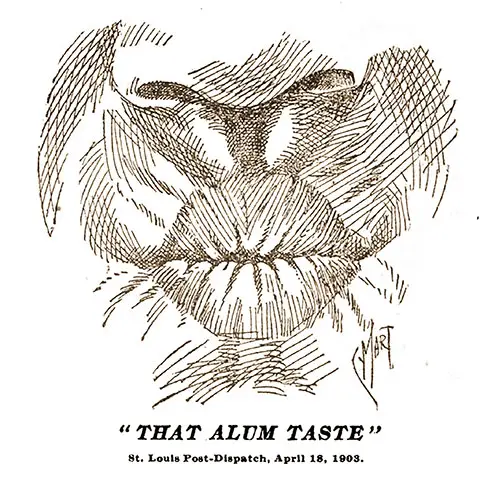
“That Alum Taste.” St. Louis Post-Dispatch, April 18, 1903. The Baking Pwder Controversy, 1907. GGA Image ID # 16429029fd
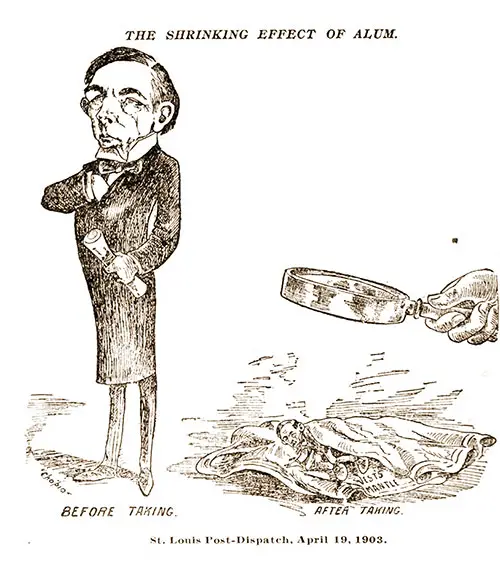
Before and After Taking Alum Baking Powder: The Shrinking Effect of Alum. St. Louis Post-Dispatch, April 19, 1903. The Baking Pwder Controversy, 1907. GGA Image ID # 164310639e
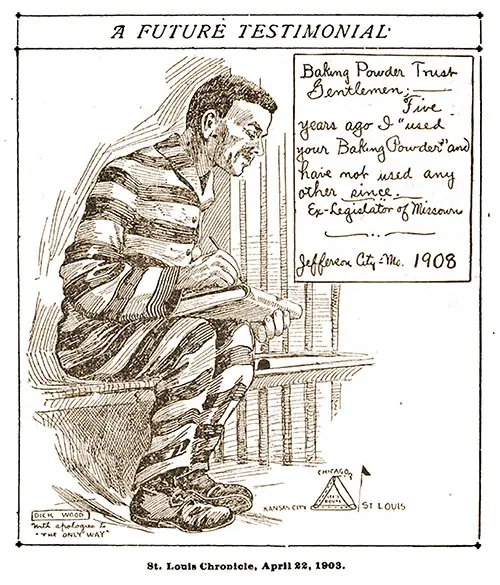
A Future Testimonial. St. Louis Chronicle, April 22, 1903. The Baking Pwder Controversy, 1907. GGA Image ID # 164317e79f
Baking Powder Trust. Gentlemen; ---- Five years ago I used your Baking Powder and have not used any other since. Ex-Legislator of Missouri. Jefferson City, MO. 1908.
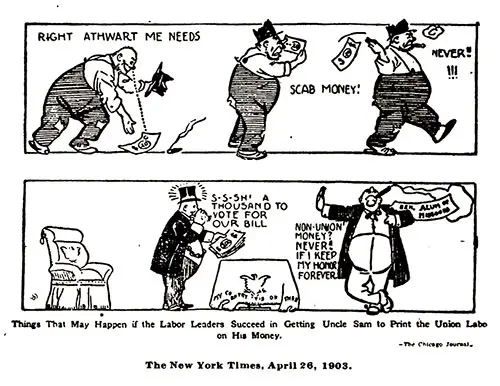
Things That May Happen if the Labor Leaders Succeed in Getting Uncle Sam to Print the Union Label on His Money. The New York Times. April 26, 1903. The Baking Pwder Controversy, 1907. GGA Image ID # 164320932d
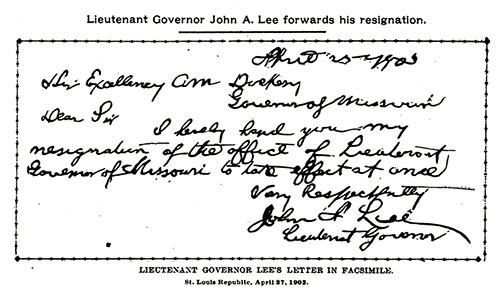
Lieutenant Governor John A. Lee forwards his resignation. St. Louis Republic, April 27, 1903. The Baking Pwder Controversy, 1907. GGA Image ID # 164332953a
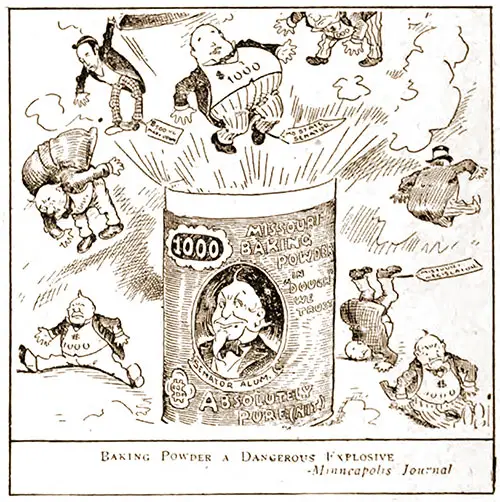
Baking Powder a Dangerous Explosive -- Minneapolis Journal, Public Opinion, May 7, 1903. The Baking Pwder Controversy, 1907. GGA Image ID # 1643f12619
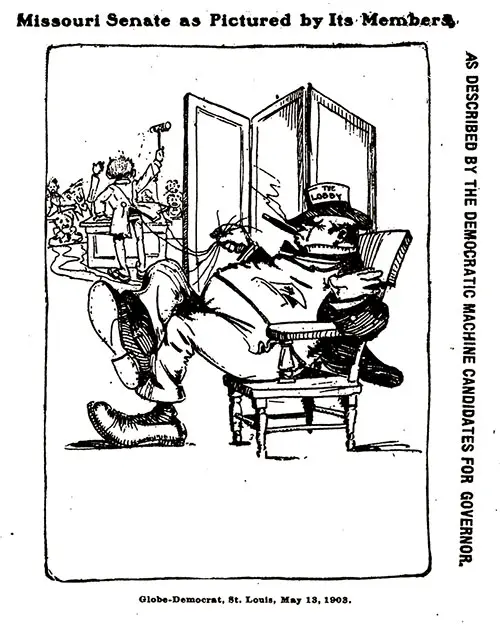
Missouri Senate as pictured by its members. As Described by the Democratic Machine Candidates for Governor. Globe-Democrat, St. Louis, May 13, 1903. The Baking Pwder Controversy, 1907. GGA Image ID # 164481335e
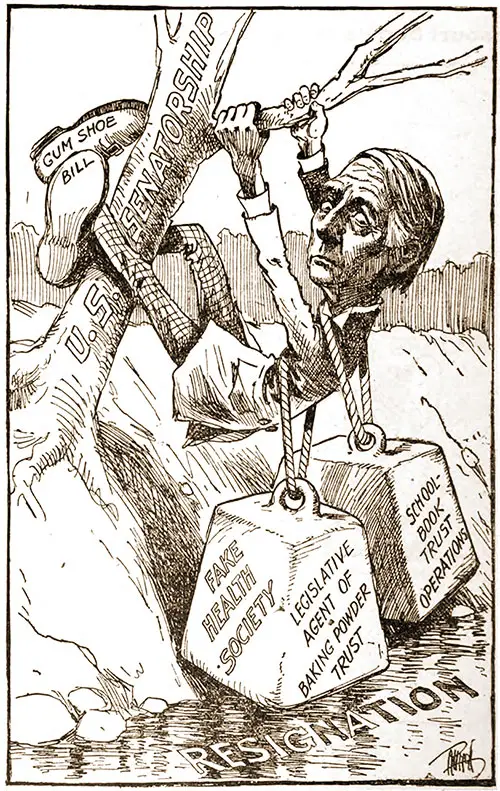
Still Hanging On. St. Louis Globe-Democrat, August 17, 1903. The Baking Pwder Controversy, 1907. GGA Image ID # 1644ae7014
U.S. Senatorship Gum Shoe Bill. Fake Healthy Society., Legislative Agent of Baking Powder Trust. School-Book Trust Operations. Resignation.
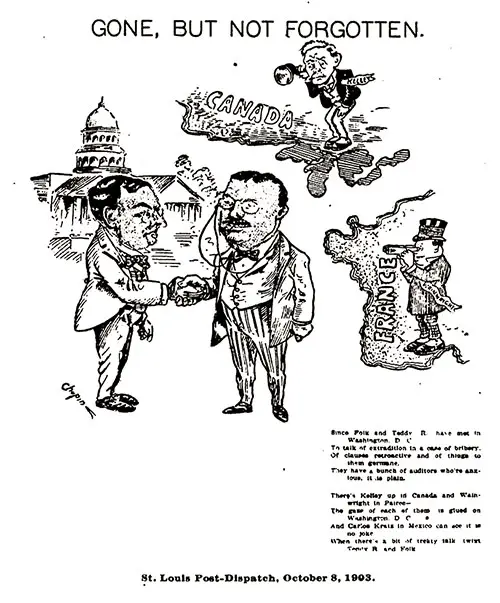
Gone but not Forgotten. St. Louis Post-Dispatch, October 8, 1903. The Baking Pwder Controversy, 1907. GGA Image ID # 1644e2e02b
Since Falk and Teddy R. have met in Washington DC
To Talk of Extradition in a Case of Bribery
Of Clauses Retroactive and of Things To Seem Germane.
They Have a Bunch of Auditors Who're Anxious, It is Plain.
There's Kelly up in Canada and Wainwright in Pairee---
The Gaze of Each of Them is Glued on Washington DC
And Carlos Kraiz in Mexico Can See It Is No Joke
When There's a Bit of Treaty Talk Twist Teddy R. and Falk.
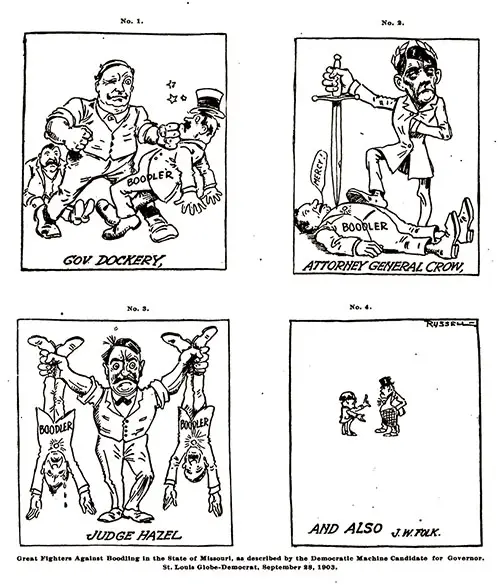
Great fighters against boodling in the State of Missouri, as described by the Democratic Machine Candidate for Governor. St. Louis Globe Democrat, September 28, 1903. The Baking Pwder Controversy, 1907. GGA Image ID # 1644e7e2a7
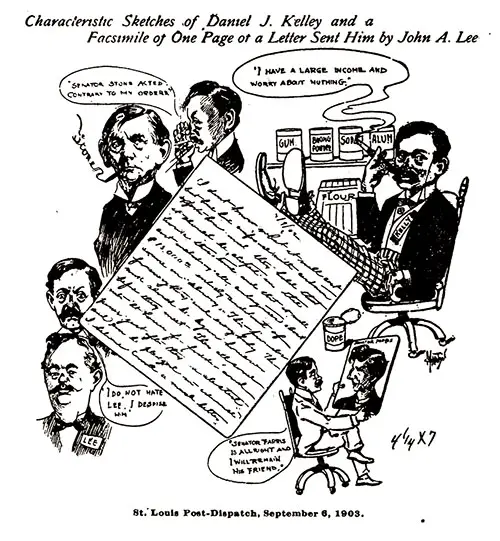
Characteristic Sketches of Daniel J. Kelley and a Facsimile on One Page of a Letter Sent Him by John A. Lee. St. Louis Post-Dispatch, September 6, 1903. The Baking Pwder Controversy, 1907. GGA Image ID # 1644ef0697
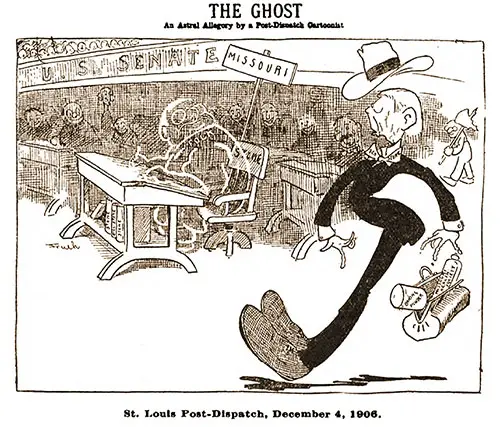
The Ghost – An Astral Allegory by a Post-Dispatch Cartoonist. St. Louis Post-Dispatch, December 4, 1906. The Baking Pwder Controversy, 1907. GGA Image ID # 1645a94c56
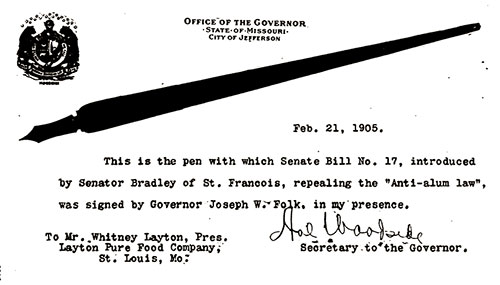
This is the Pen with which Senate Bill No. 17, introduced by Senator Bradley of St. Fracois, repealing the "Anti-Alum Law," was signed by Missouri Governor Joseph W. Falk, in the Presence of the Secretary to the Governor. The Baking Pwder Controversy, 1907. GGA Image ID # 1645c91fff
Conclusion
After many independent experiments and examinations of all results, the Board concluded that alum baking powders are no more harmful than any other baking powders, but that it is wise to be moderate in the use of foods that are leavened with baking powder.
A. Cressy Morrison, The Baking Powder Controversy, Volume II: A Compilation of Data Relating to The Origin and Advance of Baking Powder as a Household Necessity: The Monopolization of One Branch of the Industry by a Single Corporation: The Attempt of This Corporation to Destroy All Competition: The Organization of the Smaller Manufacturers for Defense and the Final Overthrow and Destruction of the Political Machinery of the Corporation by the Indictment on Charges of Legislative Corruption of its Chief Stockholder and his Political Agents. New York: The American Baking Powder Assocation, 1907.
Article EDITED by EBG by compiling stories from various books such as Baking Powder 1915, The Baking Powder Controversy 1907, Chemistry Applied to Home and Community 1923 and Modern Methods in the Office 1918))
